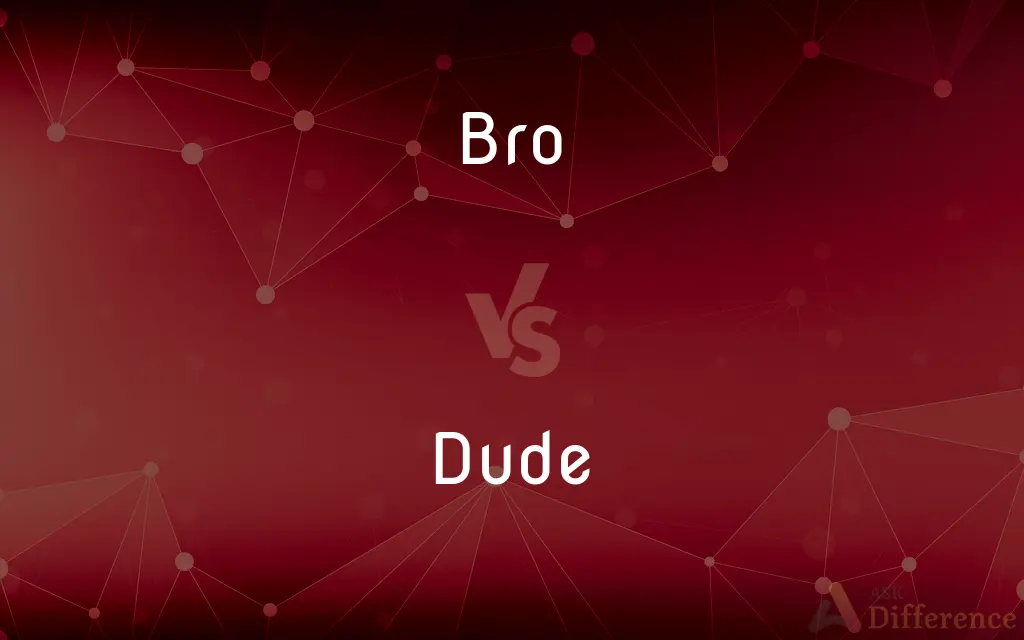Bro vs. Dude — What's the Difference?
By Maham Liaqat & Fiza Rafique — Updated on April 14, 2024
Bro emphasizes a fraternal, often close bond, suggesting brotherhood, while dude is more casual and broadly used for any male or person in general.

Difference Between Bro and Dude
Table of Contents
ADVERTISEMENT
Key Differences
"Bro" is often used to refer to a male friend or acquaintance, especially one with whom one shares a close, fraternal bond, suggesting a deeper relationship akin to that of brothers. Whereas, "dude" is a more informal term used generally to address any male individual, and has extended to gender-neutral usage, reflecting a more relaxed social interaction.
In cultural contexts, "bro" can signify a specific type of camaraderie and lifestyle associated with young men who are often seen as boisterous or conventional in their masculinity. On the other hand, "dude" carries a laid-back connotation, originally popularized in American counterculture, and has evolved into a colloquial term used in various informal settings.
The usage of "bro" has evolved within groups, often forming part of compound phrases like "bro-code" — an unwritten set of rules among close male friends. In contrast, "dude" lacks such specific cultural attachments and is utilized more freely across different groups without the implications of intimate friendship or solidarity.
In terms of linguistic evolution, "bro" is a short form of "brother" and retains much of the familial and intimate connotations of its root word. Whereas "dude" originated from the slang of the early American West, referring loosely to an individual, especially an urbanite, and has since lost much of its original context.
The term "bro" has also been adapted into the vernacular of various subcultures, leading to creations like "bromance," which denotes a close, non-romantic relationship between two men. Meanwhile, "dude" remains a versatile term, used in various subcultures without such specific adaptations, indicating its broader acceptance and usage.
ADVERTISEMENT
While "bro" might be used more selectively within certain age groups or social circles emphasizing a brother-like bond, "dude" is universally understood and used across age groups and social boundaries.
Comparison Chart
Connotation
Close, fraternal bond
Casual, relaxed
Cultural Attachment
Strong, specific
Broad, versatile
Typical Usage
Among male friends
Gender-neutral, anyone
Linguistic Origin
Short for "brother"
American West slang
Common Phrases
Bro-code, bromance
None specific
Compare with Definitions
Bro
Fellow group member.
He's not just a teammate; he's a bro.
Dude
Informal address for a man.
Hey dude, can you pass me the remote?
Bro
Fraternal term.
He treats all his close friends as his bros.
Dude
Friendly greeting.
What’s up, dude? Haven’t seen you in ages.
Bro
Informal young man.
Every weekend, the bros get together for a barbecue.
Dude
Gender-neutral term.
Look at that dude skating across the park.
Bro
Companion in activities.
My bro and I are planning a road trip.
Dude
Casual reference to a person.
That dude at the cafe makes the best coffee.
Bro
Male friend.
I always count on my bro to back me up at games.
Dude
Expression of surprise.
Dude! Did you just see that?
Bro
A brother.
Dude
Dude is English slang (originally American English) for an individual, typically male. From the 1870s to the 1960s, dude primarily meant a person who dressed in an extremely fashionable manner (a dandy) or a conspicuous citified person who was visiting a rural location, a "city slicker".
Bro
Friend; pal. Used as a form of familiar address for a man or boy
So long, bro.
Dude
A man; a guy (often as a form of address)
If some dude smacked me, I'd smack him back
Hey dude, what's up?
Bro
(slang) brother (a male sibling)
Dude
Dress up elaborately
My brother was all duded up in silver and burgundy
Bro
(slang) brother (a male comrade or friend; one who shares one’s ideals)
Dude
(Informal) An Easterner or city person who vacations on a ranch in the West.
Bro
(slang) brother (usually used to address a male)
Dude
(Informal) A man who is very fancy or sharp in dress and demeanor.
Bro
(slang) fratboy (or someone that espouses the fraternity bro culture)
Dude
A man; a fellow.
Bro
He or him
Bro said he finna go off today
You gotta go up to bro and say, "I know what you mean"
Dude
To dress elaborately or flamboyantly
Got all duded up for the show.
Dude
Used to express approval, satisfaction, or congratulations.
Dude
A man, generally a younger man.
So we were at the mall and these two dudes just walk up to us and say "hi".
Dude
A term of address for someone, typically a man, particularly when cautioning them or offering advice.
Dude, I'd be careful around the principal; he's having a bad day.
Watch it, dude; you almost knocked me over.
Dude
An inexperienced cowboy.
Dude
(slang) A tourist.
Dude
(archaic) A man who is very concerned about his dress and appearance; a dandy, a fop.
Dude
(slang) A term of address, usually for a man, conveying awe, excitement, surprise, annoyance, etc.
Dude! You finally called!
Dude
To address someone as dude.
Dude
To take a vacation in a dude ranch.
Dude
(US) Usually followed by up: to dress up, to wear smart or special clothes.
Dude
A kind of dandy; especially, one characterized by an ultrafashionable style of dress and other affectations.
The social dude who affects English dress and English drawl.
Dude
A man who is much concerned with his dress and appearance
Common Curiosities
Are there any negative connotations with "bro"?
In some contexts, "bro" can have a pejorative connotation, suggesting overly macho behavior.
Can "dude" be used in professional settings?
It's generally inappropriate to use "dude" in formal or professional settings due to its casual nature.
Can "dude" be used for females?
Yes, "dude" has evolved to be gender-neutral and can be casually used to address people of any gender.
Which term is more formal, "bro" or "dude"?
Neither term is formal; both are colloquial, though "dude" is more broadly acceptable in various contexts.
"bro" only used between actual brothers?
No, "bro" is widely used among male friends and close acquaintances to express camaraderie.
Can "bro" be used ironically?
Yes, "bro" can be used ironically to mock certain stereotypes associated with masculine camaraderie or to highlight perceived insincerity in a relationship.
How did "dude" become a popular term?
"Dude" became popular in American English as part of surfer and skater subcultures in the 1960s and 70s, and its usage spread due to its casual and inclusive connotations.
Is "dude" appropriate for all age groups?
While "dude" is universally recognized, its usage might be more common among younger individuals and less so among older generations who might prefer other terms of address.
Does "bro" imply a deeper relationship than "dude"?
Typically, yes. "Bro" implies a closer or more personal relationship, akin to brotherhood, while "dude" is more casual and can be used for acquaintances or strangers.
How has the usage of "dude" evolved over time?
Originally used to denote an urbanite who is unfamiliar with rural life, "dude" has evolved to become a laid-back, all-purpose term of address in informal settings.
What is a "bromance"?
A "bromance" is a close, affectionate, non-romantic relationship between two men, often involving deep friendship and emotional intimacy.
What does it mean when someone is called a "bro-dude"?
"Bro-dude" combines elements of both "bro" and "dude," often used to describe someone who exhibits characteristics typical of close male friendships and laid-back attitudes.
Can "dude" have different meanings based on tone or context?
Absolutely. The tone and context can change the meaning of "dude" significantly, from a friendly greeting to an expression of shock or disapproval.
How can international speakers of English understand when to appropriately use "bro" and "dude"?
Understanding the nuances of "bro" and "dude" comes from context and observing how native speakers use these terms in various social settings, media, and conversations.
Are there any specific regions in the U.S. where "bro" is more common?
"Bro" is common nationwide but might be used more prevalently in urban areas or specific social groups like college campuses or certain youth subcultures.
Share Your Discovery

Previous Comparison
Design vs. Construct
Next Comparison
Mew vs. MeowAuthor Spotlight
Written by
Maham LiaqatCo-written by
Fiza RafiqueFiza Rafique is a skilled content writer at AskDifference.com, where she meticulously refines and enhances written pieces. Drawing from her vast editorial expertise, Fiza ensures clarity, accuracy, and precision in every article. Passionate about language, she continually seeks to elevate the quality of content for readers worldwide.















































